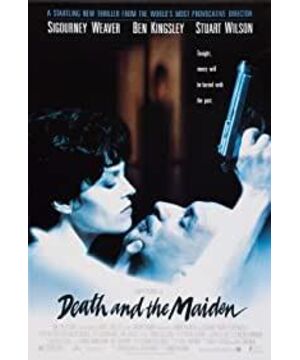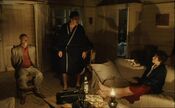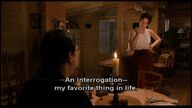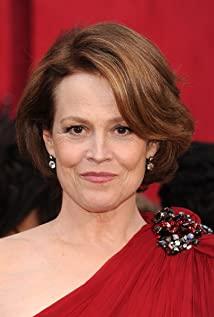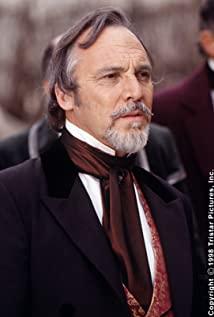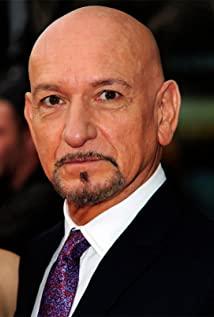I know that the main purpose of the movie is to show the inequity of the trial, thinking about the role and position of the trial and the law (the translator who knows the title thinks so, and it is estimated that it also gave many people a preconceived feeling), this diary records me The feeling of corners and corners. (The expression is really messy, after all, the corners.) Unlike the few film reviews I watched, I was shocked by the confession of the cliffside doctor. From the beginning I believed in Paulina. From her recognition of the voice, the discovery of the tape, Smelling these "conviction grounds" that have no value in court evidence, I believe she is right. Although the movie began to pave the way for Paulina's excessive tension and neuroticism. The most powerless segment in the whole movie, Paulina told her husband that this was the person who violated her back then, and the husband didn't believe it until he heard the doctor confessed. It also shows the correct but contradictory point that some victims must rationally present evidence that convinces the legal institution when they want to make a complaint for their own injuries. It is correct because I understand the "coldness" of the law. It must put out a rational and logical framework of punishment mechanism to provide justice to the victims from a rational perspective. But can the emotional damage suffered by the victim be completely compensated by rational rules? My opinion is that it can never be. The image of the husband in the movie is the representative of the law. If you don't see logical objective evidence, you won't be convicted or believed. It is also right. Is Paulina right? I don't know. In terms of social rules, she must be wrong. This is indeed an unusually immoral trial. However, I believe in her judgment. From her reasons that are not objective evidence, I believe that she is right. I understand that she wants the offender to suffer the same harm she was inflicted on. I have always been convinced in the process. Paulina will not kill the doctor. I think Paulina has always been helpless after being involved in the face of injury. At the time of the violation, she was suppressed by male power and was forced to explore the white flesh of evil desires and satisfy evil curiosity as a male. At the same time, her husband thought she was dead and was sleeping with other women. Paulina did not impose a strict judgment on her husband in terms of sex, but only in emotional terms. She only cared about whether her husband loved the woman or not. After leaving the magic cave, the law did not help Paulina find the perpetrator, and it also extended to other victims who had died and could no longer have complaints and revenge. Paulina's injury will not end with the end of the atrocities, but will continue to hurt her. Paulina’s husband never knew the details of the atrocities she suffered. It can be seen from here that Pauli As a victim, Na tried her best to reduce the pressure on her husband from this heavy incident. When the husband wanted to know the details, he repeatedly confirmed whether the husband was really ready to know. Because these atrocities were so bad and shocking that they touched the depths of the veiled evil desires that most people would never even think about. Even an unrelated person reading news reports might feel very uncomfortable. Paulina was also alone in bearing the damage after the brutality. His husband has shown great patience. Paulina chose to walk away after hearing the confession, and his husband finally believed in his wife. He felt insecure and angry at such atrocities, but finally chose reason. I don't think Paulina is relieved, but is there any other way? The victims cannot retaliate against the perpetrator with the same harm, nor can the law help the victims to be completely relieved. In the end, only the victims suffer from the conflicts that are struggling. Rape women can't use rape to avenge violent men, yet another kind of powerlessness. At the end I also thought the doctor would jump off the cliff. but. Here I think it is another small climax. The abuser can easily forgive himself. Perhaps in the fascist era at that time, there were crazy and unrestrained desires that we could not feel. From the perspective of the victim, it seems that the punishment for the perpetrator that satisfies them is homomorphic revenge. But their inescapable moral restraint prevents them from doing so, and the laws of modern society will not do so. In the face of such atrocities, even if there is legal punishment, it is still powerless. In this movie, there are powerless victims, powerless women, powerless bystanders, powerless laws, and a never-relieved ending. Perhaps the law is not the optimal solution to atrocities, and perhaps human society will have a better answer in the future. Unless the perpetrator is retaliated with the same injury, the law cannot help the victim to be completely relieved, and only the victim will suffer from the conflicts that are struggling in the end. Rape women can't use rape to avenge violent men, yet another kind of powerlessness. At the end I also thought the doctor would jump off the cliff. but. Here I think it is another small climax. The abuser can easily forgive himself. Perhaps in the fascist era at that time, there were crazy and unrestrained desires that we could not feel. From the perspective of the victim, it seems that the punishment for the perpetrator that satisfies them is homomorphic revenge. But their inescapable moral restraint prevents them from doing so, and the laws of modern society will not do so. In the face of such atrocities, even if there is legal punishment, it is still powerless. In this movie, there are powerless victims, powerless women, powerless bystanders, powerless laws, and a never-relieved ending. Perhaps the law is not the optimal solution to atrocities, and perhaps human society will have a better answer in the future. Unless the perpetrator is retaliated with the same injury, the law cannot help the victim to be completely relieved, and only the victim will suffer from the conflicts that are struggling in the end. Rape women can't use rape to avenge violent men, yet another kind of powerlessness. At the end I also thought the doctor would jump off the cliff. but. Here I think it is another small climax. The abuser can easily forgive himself. Perhaps in the fascist era at that time, there were crazy and unrestrained desires that we could not feel. From the perspective of the victim, it seems that the punishment for the perpetrator that satisfies them is homomorphic revenge. But their inescapable moral restraint prevents them from doing so, and the laws of modern society will not do so. In the face of such atrocities, even if there is legal punishment, it is still powerless. In this movie, there are powerless victims, powerless women, powerless bystanders, powerless laws, and a never-relieved ending. Perhaps the law is not the optimal solution to atrocities, and perhaps human society will have a better answer in the future.
View more about Death and the Maiden reviews


